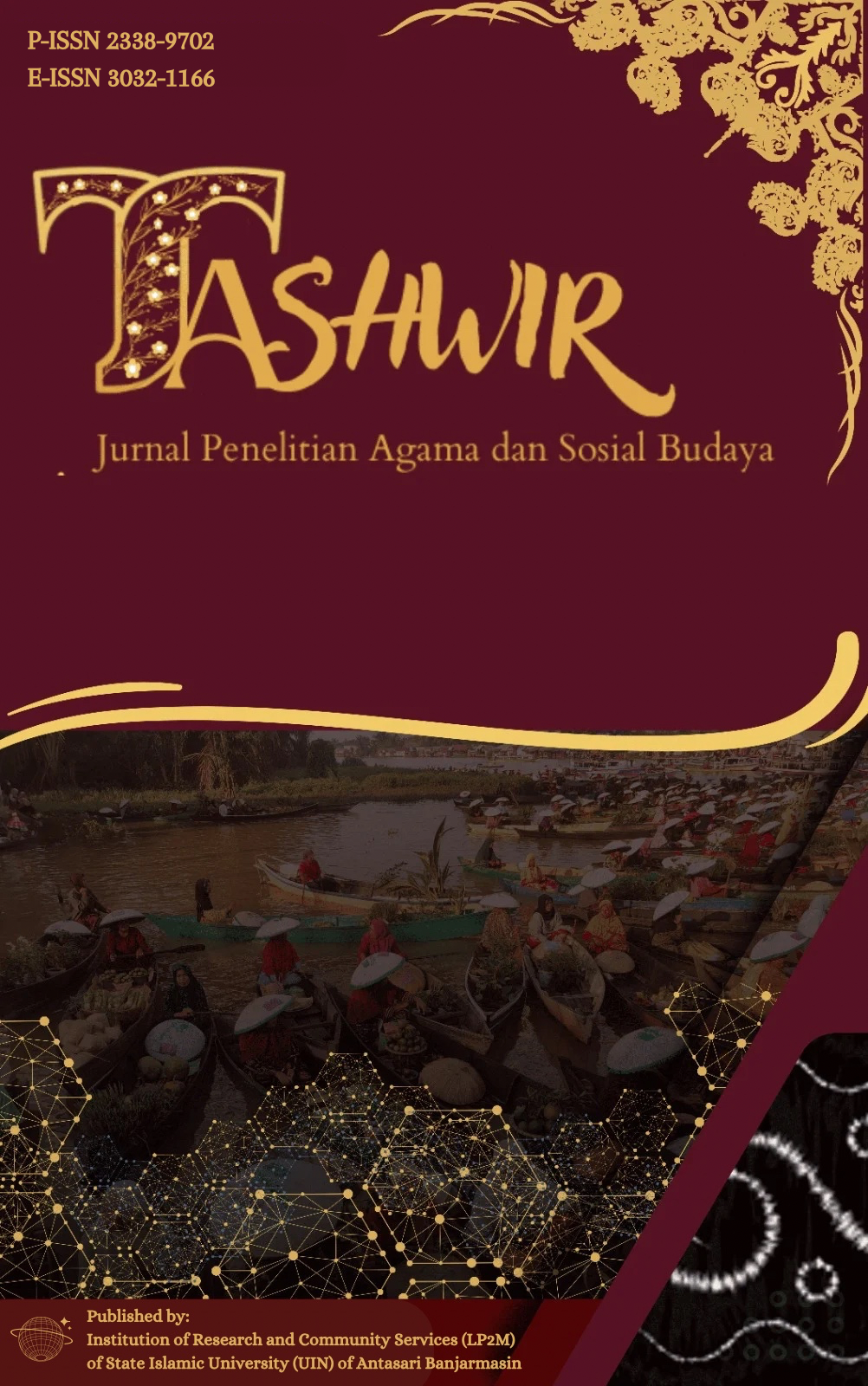ADDITIONAL MENU
About the Journal
Peer Review Process
Submissions should be prepared under the Author Guidelines. The manuscript may be returned to authors without a scientific assessment if they do not meet all submission requirements, are not in the correct format, or cannot be downloaded reliably.
Submissions must represent the original and independent work of the authors. Principal Editor assesses each new submission to determine whether it falls within the general remit of Tashwir: Jurnal Penelitian Agama dan Sosial Budaya. We will reject a manuscript without review if it contains insufficient content; it exceeds our word limit or is incorrectly formatted; it is poorly presented and unclear. Principal Editor or Associate Editor will handle manuscripts that pass the initial assessment to oversee the review process for contribution, originality, relevance, and presentation.
Once a manuscript passes the initial checks, it will be assigned to two independent experts for peer review. A Double-blind review is applied, where authors' identities are known to reviewers. Peer review comments are confidential and will only be disclosed with the express agreement of the reviewer. All manuscripts are subject to peer review, and authors can expect a decision, or an explanation for the delay, within two months of receipt. The corresponding author should submit the revised manuscript within two weeks if a revision is invited. Principal Editors make the final decision based on the information gained through the peer-review process.
As explained in publication ethics, we ensure that the reviewed manuscript is treated confidentially before publication.
Publication Frequency
Tashwir: Jurnal Penelitian Agama dan Sosial Budaya is a journal of Religius and Social Cultural Studies published by Institution of Research and Community Services (LP2M), Antasari State Islamic University (UIN) of Banjarmasin, Indonesia. The journal is published biannually in June and December.
Open Access Policy
This journal provides immediate open access to its content on the principle that making research freely available to the public supports a greater global exchange of knowledge.
Focus and Scope
Tashwir: Jurnal Penelitian Agama dan Sosial Budaya is a scientific periodical published by Institution of Research and Community Services (LP2M) of State Islamic University (UIN) of Antasari Banjarmasin which contains the results of research by experts in the field of Islamic religious and socio-cultural research in various perspectives. The focus of this journal is on important and actual issues regarding in social and cultural fields, especially in islamic perspective, such as:
o Islam and social,
o Islam and local culture,
o Spiritual Traditions,
o Role of Islam in Culture and Society,
o Islamic Ethics and Literature,
o Contemporary Islamic Religious Social Phenomena,
o islamic Values, and Local Wisdom Issues, and
o History of Islam dan Turats.
Publication Ethic
Tashwir: Jurnal Penelitian Agama dan Sosial Budaya is a peer-reviewed international journal, available in print and online and published twice a year. This statement clarifies ethical behaviour of all parties involved in the act of publishing an article in this journal, including the author, the chief editor, the Editorial Board, the peer-reviewer and the publisher (Antasari State Islamic University (UIN) – Banjarmasin, Indonesia).
Ethical Guideline for Journal Publication
The publication of an article in a peer-reviewed Tashwir: Jurnal Penelitian Agama dan Sosial Budaya is an essential building block in the development of a coherent and respected network of knowledge. It is a direct reflection of the quality of the work of the authors and the institutions that support them. Peer-reviewed articles support and embody the scientific method. It is therefore important to agree upon standards of expected ethical behavior for all parties involved in the act of publishing: the author, the journal editor, the peer reviewer, the publisher and the society.
Antasari State Islamic University – Banjarmasin, Indonesia as publisher of Tashwir: Jurnal Penelitian Agama dan Sosial Budaya takes its duties of guardianship over all stages of publishing seriously and we recognize our ethical and other responsibilities. We are committed to ensuring that advertising, reprint or other commercial revenue has no impact or influence on editorial decisions.
Publication decisions
The editor of the Tashwir: Jurnal Penelitian Agama dan Sosial Budaya is responsible for deciding which of the articles submitted to the journal should be published. The validation of the work in question and its importance to researchers and readers must always drive such decisions. The editors may be guided by the policies of the journal's editorial board and constrained by such legal requirements as shall then be in force regarding libel, copyright infringement and plagiarism. The editors may confer with other editors or reviewers in making this decision.
Fair play
An editor at any time evaluate manuscripts for their intellectual content without regard to race, gender, sexual orientation, religious belief, ethnic origin, citizenship, or political philosophy of the authors.
Confidentiality
The editor and any editorial staff must not disclose any information about a submitted manuscript to anyone other than the corresponding author, reviewers, potential reviewers, other editorial advisers, and the publisher, as appropriate.
Disclosure and conflicts of interest
Unpublished materials disclosed in a submitted manuscript must not be used in an editor's own research without the express written consent of the author.
Duties of Reviewers
Contribution to Editorial Decisions
Peer review assists the editor in making editorial decisions and through the editorial communications with the author may also assist the author in improving the paper.
Promptness
Any selected referee who feels unqualified to review the research reported in a manuscript or knows that its prompt review will be impossible should notify the editor and excuse himself from the review process.
Confidentiality
Any manuscripts received for review must be treated as confidential documents. They must not be shown to or discussed with others except as authorized by the editor.
Standards of Objectivity
Reviews should be conducted objectively. Personal criticism of the author is inappropriate. Referees should express their views clearly with supporting arguments.
Acknowledgement of Sources
Reviewers should identify relevant published work that has not been cited by the authors. Any statement that an observation, derivation, or argument had been previously reported should be accompanied by the relevant citation. A reviewer should also call to the editor's attention any substantial similarity or overlap between the manuscript under consideration and any other published paper of which they have personal knowledge.
Disclosure and Conflict of Interest
Privileged information or ideas obtained through peer review must be kept confidential and not used for personal advantage. Reviewers should not consider manuscripts in which they have conflicts of interest resulting from competitive, collaborative, or other relationships or connections with any of the authors, companies, or institutions connected to the papers.
Duties of Authors
Reporting standards
Authors of reports of original research should present an accurate account of the work performed as well as an objective discussion of its significance. Underlying data should be represented accurately in the paper. A paper should contain sufficient detail and references to permit others to replicate the work. Fraudulent or knowingly inaccurate statements constitute unethical behaviour and are unacceptable.
Originality and Plagiarism
The authors should ensure that they have written entirely original works, and if the authors have used the work and/or words of others that this has been appropriately cited or quoted.
Multiple, Redundant or Concurrent Publication
An author should not in general publish manuscripts describing essentially the same research in more than one journal or primary publication. Submitting the same manuscript to more than one journal concurrently constitutes unethical publishing behaviour and is unacceptable.
Acknowledgement of Sources
Proper acknowledgment of the work of others must always be given. Authors should cite publications that have been influential in determining the nature of the reported work.
Authorship of the Paper
Authorship should be limited to those who have made a significant contribution to the conception, design, execution, or interpretation of the reported study. All those who have made significant contributions should be listed as co-authors. Where there are others who have participated in certain substantive aspects of the research project, they should be acknowledged or listed as contributors. The corresponding author should ensure that all appropriate co-authors and no inappropriate co-authors are included on the paper, and that all co-authors have seen and approved the final version of the paper and have agreed to its submission for publication.
Disclosure and Conflicts of Interest
All authors should disclose in their manuscript any financial or other substantive conflict of interest that might be construed to influence the results or interpretation of their manuscript. All sources of financial support for the project should be disclosed.
Fundamental errors in published works
When an author discovers a significant error or inaccuracy in his/her own published work, it is the author’s obligation to promptly notify the journal editor or publisher and cooperate with the editor to retract or correct the paper.
Plagiarism Check
All submitted articles will undergo plagiarism screening using TURNITIN.







